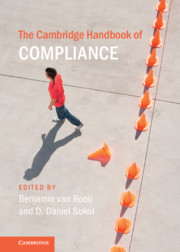Book contents
- The Cambridge Handbook of Compliance
- The Cambridge Handbook of Compliance
- Copyright page
- Contents
- Figures
- Tables
- Contributors
- 1 Introduction: Compliance as the Interaction between Rules and Behavior
- Part I Compliance Concepts and Approaches
- Part II Deterrence and Incapacitation
- Part III Incentives
- Part IV Legitimacy and Social Norms
- Part V Capacity and Opportunity
- 32 Do People Know the Law? Empirical Evidence about Legal Knowledge and Its Implications for Compliance
- 33 Self-Control and Offending
- 34 Substance Abuse, Self-Control and Crime
- 35 The Opportunity Approach to Compliance
- Part VI Compliance and Cognition
- Part VII Management and Organizational Processes
- Part VIII Measuring and Evaluating Compliance
- Part IX Analysis of Particular Fields
- References
32 - Do People Know the Law? Empirical Evidence about Legal Knowledge and Its Implications for Compliance
from Part V - Capacity and Opportunity
Published online by Cambridge University Press: 07 May 2021
- The Cambridge Handbook of Compliance
- The Cambridge Handbook of Compliance
- Copyright page
- Contents
- Figures
- Tables
- Contributors
- 1 Introduction: Compliance as the Interaction between Rules and Behavior
- Part I Compliance Concepts and Approaches
- Part II Deterrence and Incapacitation
- Part III Incentives
- Part IV Legitimacy and Social Norms
- Part V Capacity and Opportunity
- 32 Do People Know the Law? Empirical Evidence about Legal Knowledge and Its Implications for Compliance
- 33 Self-Control and Offending
- 34 Substance Abuse, Self-Control and Crime
- 35 The Opportunity Approach to Compliance
- Part VI Compliance and Cognition
- Part VII Management and Organizational Processes
- Part VIII Measuring and Evaluating Compliance
- Part IX Analysis of Particular Fields
- References
Summary
Abstract: Legal knowledge is a core aspect in compliance. For law to shape behaviour, people whose conduct the law tries to influence should know the law. This chapter reviews the body of existing empirical research about legal knowledge. It assesses the extent to which laypersons and professionals know and understand legal rules across various domains including employment, family affairs, criminal justice, education and health care. This body of work shows that ignorance and misunderstanding of the law are common across these domains. There is variation and for some laws, amongst some people and in some jurisdictions, there is more or less legal knowledge. Also, the review shows that there is evidence that people tend to equate their own norms with the rules of the law. The chapter concludes by discussing what these findings mean for compliance and the way our laws try to steer human and organisational conduct. Here it questions compliance approaches that view it as a linear process from rule to behaviour.
- Type
- Chapter
- Information
- The Cambridge Handbook of Compliance , pp. 467 - 488Publisher: Cambridge University PressPrint publication year: 2021
References
- 15
- Cited by

